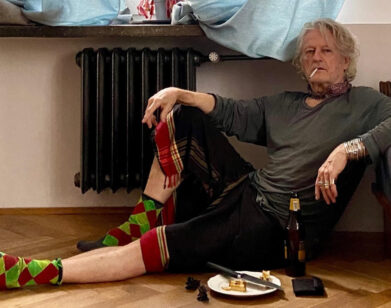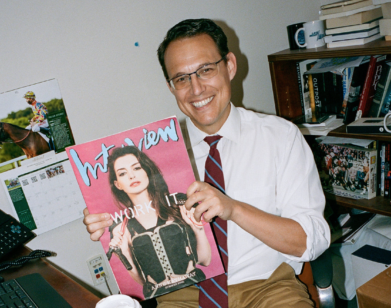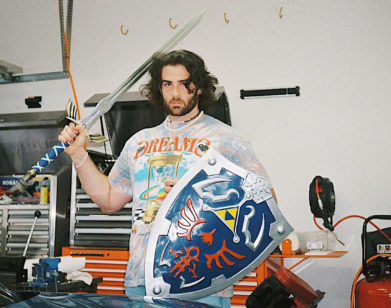ASK A SANE PERSON
Michelangelo Signorile on the Perils of Complacency and “Victory Blindness”

Every afternoon for three hours on SiriusXM radio, “The Michelangelo Signorile Show” has offered a lifeline of sanity and smart political discourse in these grueling and maddening times. Signorile has been fighting the good and progressive fight for decades, starting with his seminal writing on Queer America and gay activism (at one point serving as the head of ACT UP’s media arm). He’s also developed his own online newsletter, “The Signorile Report,” where he covers the latest political horrors with thoughtful analysis.
———
INTERVIEW: Where are you and how long have you been isolating?
MICHELANGELO SIGNORILE: In Manhattan, since March 13.
INTERVIEW: What has this pandemic confirmed or altered about your view of society?
SIGNORILE: That things can move very swiftly, and everything can turn on a dime.
INTERVIEW: What is the worst-case scenario for the future?
SIGNORILE: We see more spikes, and no effective vaccine for a long time—just a few less-than-effective ones. I also worry about another virus coming out of nowhere.
INTERVIEW: What good can come out of this lockdown? Are there any reasons to hope?
SIGNORILE: For those lucky enough to keep their jobs and work at home, it’s been a time of creating better habits, seeing that we can all get on with less. We’ve been through worse —certainly as a gay man, I’ve been through the HIV epidemic much of my adult life—and many have come together to fight tyranny and negligence.
INTERVIEW: What has been your daily routine during this time?
SIGNORILE: Up early, scouring news, writing a bit, preparing for my radio show on weekdays. Exercise or a run. Shower, then three hours on the radio. Make dinner with my husband, maybe we watch some TV.
INTERVIEW: Describe the current state of your hair?
SIGNORILE: I’m back to my barber once a week (in masks) to get a close buzz of what’s left of my hair! But it was crazy there for a while.
INTERVIEW: On a scale of 1 to 10, what is your level of panic about the current state of the world?
SIGNORILE: Seven.
INTERVIEW: Do you think there is hope for true racial equality in the United States? What do you think is the first step in that goal?
SIGNORILE: Yes, there is always hope. It rises out of activism. But the first step is people realizing that the fight never ends, and that the wins ebb and flow. Too many people jump in, think they change laws, think it’s over. It’s never over. People can change, they can be educated—and so can the government. It takes persistence, challenging all the time, and never thinking it’s done.
INTERVIEW: Do you think protests are effective tools for changing the system? How does it make a difference in the long term?
SIGNORILE: Protest is a voice. It screams for justice and is so important. It shuts down the daily routine and says, “Listen up!” It is also personally satisfying for those protesting, and necessary for their minds and bodies. It’s empowering and it unites people. But it needs to be followed up by political organizing.
INTERVIEW: How do you personally channel your anger? Do you find anger to be a useful emotion?
SIGNORILE: Anger is vital. It gets you moving. I try to channel it by targeting those who need to be exposed or criticized or challenged, either in my writing or on the air. But sometimes my anger about one thing—a Supreme Court nomination—might be channeled toward something or someone else, like seeing someone without a mask on the subway and telling them to put a damned mask on.
INTERVIEW: Which young leaders of the moment inspire you?
SIGNORILE: Just to name a few: Charlotte Clymer. DeRay McKesson. David Hogg. Gabe Ortíz. Chase Strangio. Greta Thunberg. Indya Moore. Jared Holt. Juan Escalante. AOC. Alex Morse. Megan Rapinoe. So many more.
INTERVIEW: What’s the next step after protests in the streets? Where does the righteous rage go?
SIGNORILE: To more, and different, protests. Protests do not have to be large or in the streets. Targeted, sustained protest by small groups—of a particular senator, say, or some other government official—is just as effective. And being creative is so important in this media environment, because the goal is always about getting the message out. So you have to think of new ways to get attention. Secondly, it has to be a message that translates into policy change. Once you have people’s attention, people who are in power, and they really want to make a change, you have to have a concrete plan of action for them to work off of.
INTERVIEW: What thinker have you taken comfort in of late and why?
SIGNORILE: Laurie Garrett. She wrote the book The Coming Plague almost 25 years ago, and it’s been revelatory.
INTERVIEW: Where did we go wrong? Like, what was the exact moment?
SIGNORILE: Thinking we’d arrived, thinking the fight for civil rights—for so many groups—was over. This was during the Obama years. A complacency—I called it “victory blindness” in my last book.
INTERVIEW: Which (admittedly totally unqualified) celebrity would you trust with the planet’s future?
SIGNORILE: Jane Fonda, of course.
INTERVIEW: What’s one skill we should all learn while in quarantine?
SIGNORILE: Learning another language. Though I admit I haven’t done it.
INTERVIEW: What prevents you from giving up hope in the human race?
SIGNORILE: That people are alive, that they must survive, and that they will fight.
INTERVIEW: What is the most pressing issue facing the nation and the world that needs to be addressed in the next four years?
SIGNORILE: The planet is burning. We have to do what we can to stop it.
INTERVIEW: Who should be the next president of the United States?
SIGNORILE: Joe Biden, fingers crossed.






